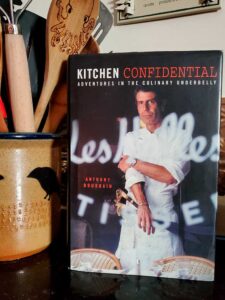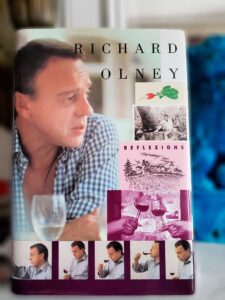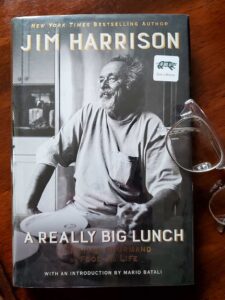Layne’s Wine Gig Presents
FOUR WRITERS
The true story behind four writers who shaped and changed our food and wine culture
By Layne V. Witherell
ANTHONY BOURDAIN (1956-2018), ‘KITCHEN CONFIDENTIAL‘
Most of us know Anthony Bourdain as the lanky, adorable ex-chef traveling the planet’s backwater, third world, swampy countries, observing and contemplating with the locals in context along with their lives. All the while he was conversing through a kumbaya, “We are the World,” styled CNN travelog.

There is another, earlier, gnarlier Anthony Bourdain, author of “Kitchen Confidential,” a chef tell-all published in the year 2,000. You can purchase a used paperback for around six bucks on abe.com. Or save up and wait for a signed hard cover – for around $1,000.00 per copy – to show up. Your choice.
You need to read this book, not so much for tips about roasting bones for stock or the woes and hierarchies of ghastly unsustainable life in the kitchens (manned by lots of undocumented immigrants), while working in major New York restaurants. You can as well experience a cast of “cunning, manipulative, mercurial… and terrifying people.” But you will also see how much the world has changed in twenty-three short years. This book is a revelatory ride.
Frankly, I don’t see how “Confidential” could be published today. It is sexist, racist, profane, misogynistic, totally politically incorrect, outrageous, drug fueled, and a major work of artistic writing achievement. The book is not only brilliant, but in today’s world it reads more like Jonathan Swift, a fierce biting satire in rebuttal to our universal attempts at inclusivity. Talented, with a quirky, driven work ethic, and sheer tenacity, this was his vocabulary. We won’t see the likes of him again.
RICHARD OLNEY (1927-1999), ‘REFLEXIONS‘

“He could be absolutely charming if you treated him to be the genius he considered himself to be,” said Julia Child.
If Anthony Bourdain was the master of the vernacular, then Richard Olney had to have been a reincarnation of French royalty. Although he was born in Iowa to a wealthy family, he lived in the tiny French hamlet of Sollies-Toucas near Provence for his entire life.
On the plus side:
His French was flawless, as were his cooking, teaching, and writing skills.
The wines tasted in this book together with the “Who’s Who” of the wine and food world would require either winning the billion-dollar lottery or the sale of a ton of Microsoft stock to afford. He was a connoisseur with a capital “C,” also a major organizer of tastings of cellars and meals. You left his dinners in a “vapor of ecstasy.” He freely admits that “wines were not that expensive then.” The list of mid-19th and early 20th century wines he drank is mind blowing.
He edited the 28-volume series on food by Time Life books. He also wrote the hugely popular “Simple French Food,” wrote books on cooking in Provence, and did the authoritative research and production for the book on the world’s greatest wine, Romanee Conti.
So… why is it the James Beard Award and not the Richard Olney Award?
On the minus side:
He lived in a virtual shack in an out of the way spot in the south of France. “Where he could live and work in solitude.”
He never lived in New York and didn’t do the television chef circuit with a tribe of little apprentice chefs, ala Julia Child and James Beard.
Olney preferred to choose his people and chose contempt toward James Beard (the first of America’s major celebrity chefs), “it was hate at first sight. Jim held forth with banal pronouncements and cliches. He had arrived at the period in his career when he expected listeners to bow in silence to his superior wisdom.”
Referring to James Beard as a pompous buffoon would not get you on the awards short list.
His legacy:
Olney tutored a young wine merchant from Berkeley, California named Kermit Lynch, writing the preface to his book “Adventures on the Wine Route.” The book has been continuously in print since 1988. Kermit, brilliantly, would go on to become one of America’s most important wine importers. This, and his book on Romanee Conti, are Richard Olney’s legacy.
“Reflexions” is more of a diary with menus and wines tasted – wines that are among those enjoyed by the wine gods or people who have just won the big lottery. It is also a delicious, and bitingly gossipy read.
BRETT ANDERSON, ‘INSIDE THE “TOP CHEF” INDUSTRIAL COMPLEX,’ THE NEW YORK TIMES, March 9, 2023
Unfortunately, little of our wisdom comes from books today. Well, not to worry. This article takes you inside the minds of the producers of the wildly popular series on Bravo called “Top Chef,” who turn 200 hours of footage into 54 minutes of “compelling television.” They invent story lines, spin a narrative, and sprinkle a heavy dose of “Michelin star and James Beard Award” references with the drama of “The Real World.” Brought to us, of course, through the skills and well-crafted charisma of the top chefs. This is reality television meets cooking with $250,000 as first prize – along with an extra helping of fame.
It was all well and good except for their wading into the deep waters of social justice, the #MeToo movement, Black Lives Matter, fair wages, etc. Meanwhile, in the words of a former contestant, during a scandal the owners stepped in to “Protect the brand at all costs.” There is nothing quite like that good old nondisclosure agreement to make unpleasantness go away.
JIM HARRISON (1937-2016), ‘A REALLY BIG LUNCH‘

It is time to get off that social media device and see what a real curmudgeon writer looks like, up close and personal and in print. Wisdom from Jim Harrison:
“I was handed a glass of cheapish California Chardonnay and said, ‘this might be good on pancakes if you were in the wilderness.'”
“Any fool knows that red wine is the best energy drink if you keep it within two bottles.”
“The total check for the Iraq war and restoration will be six hundred billion dollars. If only this much money had been spent on French wines for our entire populace, there would never have been a war, only well-oiled diplomacy.”
“The free-market economy is a leash-less Labrador who will eat everything.”
“Wine crawls into the windows of your life and never leaves.”
“We are delightfully trapped by our memories. I can’t drink a bottle of Chateauneuf-du-Pape Vieux Telegraphe without revisiting a hotel bistro in Lucerne, Switzerland, where I ate a large bowl of peppery baby goat stew. A sip and a bite. A sip and a bite.”
Jim Harrison nailed it. His life was: “A sip and a bite. A sip and a bite.” And some damned fine writing to boot.





